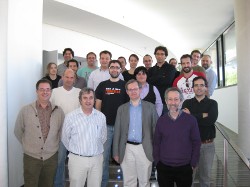 |
 |
|||||||||||||
|
|||||||||||||
|
|||||||||||||
|
The Spanish National Network for Future Linear Colliders met in Valencia, Spain on 25 and 26 October. Representatives from all Spanish groups involved in R&D activities on detectors and accelerators for future colliders, as well as physicists from theory groups, attended the meeting which showed big advancements developed in all the activities of the Spanish groups, both in accelerators and detectors. The challenge of organising the next global Linear Collider Workshop in 2011 at Granada was also very well received by the Spanish community.
During the meeting, the various groups reported on their current work and their results. The Spanish groups belong to many international R&D collaborations such as SILC (Silicon for Linear Colliders), DEPFET (Depleted P-Channel Field Effect Transistor), and CALICE (Calorimetry for Linear Collider), and are members of European Projects EUDET and AIDA for detectors as well as ELAN-CARE, EUROTEV for accelerators. They have signed both the SiD and the ILD detector concepts of the ILC. The meeting was completed by theoretical talks, in this case from the University of Granada, showing the complementarity of a linear collider over the LHC, to measure coupling parameters precisely. Also, Francisco del Águila, present chairman of the Spanish National Programme of High Energy Physics, gave a talk showing the situation and prospects of this fundamental key to the Spanish R&D. Brian Foster, representing the Global Design Effort as invited speaker, analysed the present situation concerning the ILC and CLIC projects. Foster described the status of ILC, the scheduling and prospects. Foster explained that they were good reasons to think that ILC was reaching its maturity and could be approved in few years, after having the first results of LHC. Results presented during the recent International Workshop on Linear Colliders in Geneva (IWLC2010) were summarised as well. A discussion on strategic issues and the Spanish organisation in the national and international scenarios closed the meeting. Spanish Network for Future Linear Colliders According to the director of the Spanish Network for Future Linear Colliders, Alberto Ruiz, the activities related to the ILC in Spain started with some theoretical work in the nineties, but the "real work" started in the last five years. The Spanish Network was created in 2005, directed by Juan Fuster, from the Instituto de Física Corpuscular de Valencia (IFIC, CSIC-Universidad de Valencia), and Juan Terrón, from Universidad Autónoma de Madrid (UAM). The excellent technological possibilities of the International Linear Collider project, both for detectors (silicon sensors, calorimetry) and accelerators, in particular superconducting magnets, attracted the interest of several institutions, but the Spanish participation in the ILC project was really boosted by the International Meeting held in Valencia in November 2006. That was an excellent opportunity to give visibility of the Spanish interest in participating in ILC, as well as the interest of the international community in the Spanish participation. The Spanish groups working actively in the development of ILC are the Instituto de Física Corpuscular de Valencia (IFIC), the Centro de Investigaciones Energéticas, Medioambientales y Tecnológicas (CIEMAT), the Instituto de Física de Cantabria (IFCA), the Universidad de Barcelona (UB), the Centro Nacional de Microelectrónica (CNM), the Universidad de Santiago de Compostela (USC), the Universidad Ramón Llull (URL) and the Universidad de Granada (UGR). Other groups, as the Instituto de Física de Altas Energías (IFAE) and Universidad Autónoma de Madrid (UAM), regularly attend the national meetings of the network. Other collaborating institutions are the Instituto Tecnológico de Aragón (ITA), the Instituto Nacional de Técnica Aeroespacial (INTA) and the Centro Nacional de Aceleradores (CNA). Alberto Ruiz, from IFCA, is also member of the ILD detector project, coordinating the efforts for a Forward Tracker Detector (FTD), and Juan Fuster is European representative in the International Linear Collider Steering Committee. The Spanish Network for Future Linear Colliders meets twice a year in order to share their studies and developments on the field. The first meeting was in Santander in 2008, followed by Santiago de Compostela, Barcelona, Madrid and finally, in last October, Valencia. The next one will be held in Granada. -- Isidoro Garcia (Centro Nacional de Física de Partículas, Astropartículas y Nuclear)
More information |
|||||||||||||
| © International Linear Collider |
